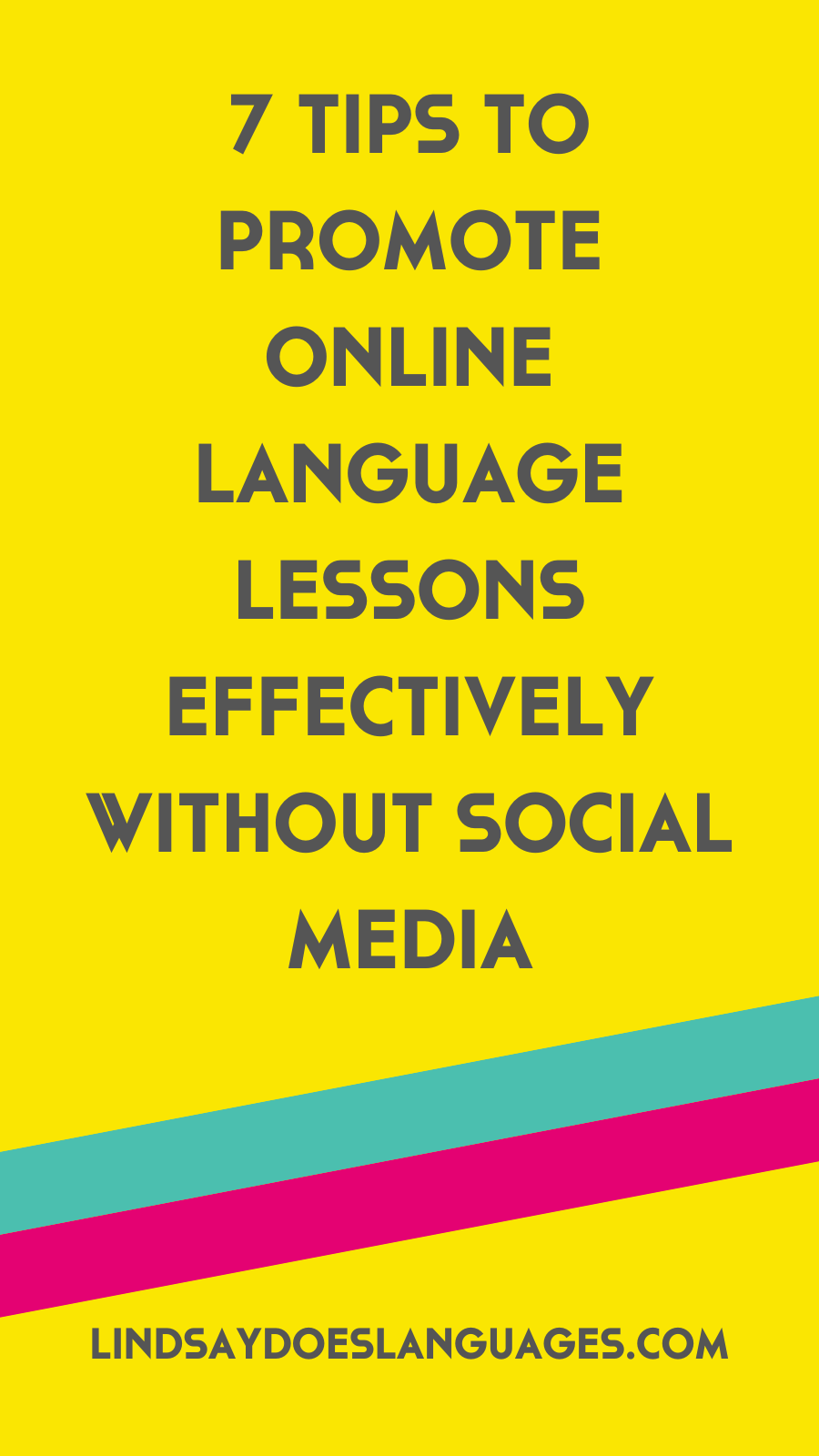Learning a language can be challenging and difficult. And, it’s even more difficult to find opportunities to practice your skills and get feedback from speakers. That’s where online language lessons come in! You can use your expertise as an online teacher to help others learn languages in a fun, interactive way. But…how do you market yourself as an online language teacher? Do you need to use social media? The answer is: not necessarily. Here are some tips on how to promote yourself without relying on social media.

7 Tips to Promote Online Language Lessons Effectively Without Social Media
Focus on your target audience
To begin, you must first define your target audience. This is the group of people that you are trying to attract with whatever you do to promote online language lessons. You can’t market effectively unless you know who they are and what they want. Knowing their needs, wants, interests and language learning goals will help you create content that is relevant to them and show them how they can get what they want from your services or products (in this case, online lessons).
Once you have defined what type of person would be interested in learning a language through your online platform, it is important to know more about them so that when creating content, you’re creating content that will appeal directly towards their needs, wants, and interests.
In the Online Teaching Starter Kit, this is one of our early lessons – figuring out who you want to be talking to and we go so deep!
Once you have an idea of who your target audience are, you can begin to think about not only your own content, but other places to market your online language lessons too.
Which podcasts do they listen to in their free time? What other blogs are they reading? What interests them outside of languages?
Answering these questions helps you to establish places you can reach out to for promo.
Related: How to Find New Students When Teaching Online
Start a blog, website, and an email list.
Write about topics that are of interest to your target audience.
Think about a topic that you can write about to attract people who are interested in learning the language you teach in the way you teach it. If you’re not sure what kind of topics would be interesting to your target audience, take some time to brainstorm some ideas.
Consider what questions people would have about learning your language, and then write about them. For example, if you teach English to Chinese speakers, why not write a blog post on how to pronounce Chinese words in the way that native speakers do? Or if you teach Spanish, why not write a post on the different ways that countries around the world celebrate Cinco De Mayo?
Your blogs will ideally give opportunities for people to find you years from now. So consider the longevity of what you write and share as well.
You know how you come across websites you love and then forget the name and never end up going back? Yeah…we don’t want that happening for you and your blog.
So make sure that in each blog, you’re giving people the chance to join your email list too. This way they can stay more up to date with everything you have to share and actually remember you!
Your blog will live on your website, so it’s important that visitors are impressed when they arrive for the first time. Make sure your homepage isn’t cluttered or confusing; make sure people can easily find ways to join your email list and stay up-to-date with what you’re up to.
Related: 3 Big Ways to Promote Your Online Language Teaching Business
Regularly reach out to podcasts.
Podcast interviews are a great way to reach potential new students. Plus, unlike writing guest blogs, podcast interviews are a great way to get your name out there without putting in excessive effort. You record once, and you’re done! Whereas with a guest blog, there might be multiple edits to go back to, overall taking more time.
Podcast audiences can be really niche – ideal for speaking to exactly who you want to speak to, so be sure to research the podcasts that are relevant to your audience.
You can also try reaching out to podcast hosts directly, but be sure to include a link to your site as well as a brief description of what you do! This is a great way for them to get an idea of who you are and why you’re worth listening too.
Keep track of who you reach out to, and do it often. Making this a regular part of your routine will mean you’ll hear lots of ‘no’s’ (or not get a reply at all), but keep going and you’ll get the gems in there who respond!
Related: The Ultimate Guide to Language Learning Podcasts
Offer free or paid group sessions.
Use Eventbrite, Meetup, Duolingo Events, or local guides to host online or real life group sessions.
These can be free or paid. For example, you could offer a free group session for people to come and learn one element about what you do. Say you teach French, this could be a session for beginners to learn holiday essentials.
You can also create paid group sessions where people can book time with you in exchange for money. This is a great way to get some initial sales and feedback from clients who may be interested in hiring you down the line.
Hosting a group session is an awesome way to build your audience, gain new followers, and earn some income. Start with a free session and see how that goes. If it’s successful, consider making your next one paid.
They also act as great promotion to get the word out about your business and what you offer.
If you do host a paid group session, be sure to promote it ahead of time. You can create a blog post that goes out several days before the event with details about what the session will include and how people can sign up. This will give readers plenty of time to plan for it and get ready for your work together!
Related: How to Start Teaching Online in a Post-2020 World Full of Zoom Fatigue
Get referrals from happy clients.
Already worked with happy clients? Ask them if they know anyone else who’d love what you do. If you do get a referral, be sure to follow up with the person who referred them. Thank them for their support and see if they have any suggestions or feedback on how your service could be improved.
You can offer previous of current students an incentive, such as a coupon code or free product.
Word of mouth is still a powerful tool to market your online teaching, and definitely one worth putting some time into.
Related: Master the Art of Teaching Languages Online: How to Create a Rewarding Online Teaching Business.
Go Guerrilla Style
You may think of Che Guevara t-shirts at the word guerrilla, but we’re not talking guerrilla warfare here.
Guerrilla marketing is the type of stuff you see going viral online nowadays. There’s some great examples here including Deadpool having a Tinder profile to promote the film.
The reason I’m including this here is that when you explore examples of guerilla marketing, they have a few things in common:
They’re fun.
They get the name out of what they’re promoting in a memorable way.
They spark creativity and make you want to do it too!
Of course, you’re probably not going to fill a vending machine with dirty water or start a pop-up ice cream van (see the link above and that’ll all make sense!). But there’s plenty of ways you can inject this kind of fun into your own ways to promote online language lessons.
Think April Fool’s videos (Watch Me Speak 784 Languages), fun quizzes (Which 80s Pop Song Describes Your Learning Style?), sarcastic blog posts (7 Reasons Why Language Learning Sucks).
The kind of stuff people want to share is what works here.
Related: 4 Habits of Highly Successful Online Language Teachers
Go on a PR Spree!
There are many ways to do this. You can write a blog post about your experience, promote it on social media, and then email local news outlets with the link. This is a great way to show off your teaching style and get some press for yourself.
If you’re feeling particularly ambitious, you can even write an article for a larger publication and pitch it to them. You could also contact local news outlets and offer to do an interview about your experience as an online teacher.
If you’ve got a story to tell then get it out there! Even better if it links to a product you have available. For example, what happened to you that inspired you to write your latest story book for learners or make that online course about grammar?
Yes, you can promote yourself without social media!
If you’re a language teacher and want to promote online language lessons, social media is not the only way. There are many other options that you can take advantage of without having to spend money or being on social media.
Remember: businesses existed long before social media was a thing! Get creative and think how else you can market your online language lessons.
Even if you choose to continue with social media to market your online language lessons, there’s no reason to not try these ideas as well. Have fun!







